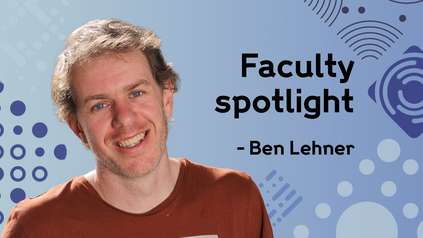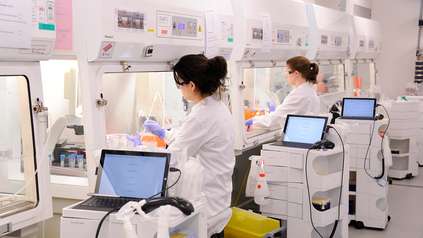Academy of Medical Sciences announces new Sanger Institute Fellows
Announced today (18 May), they join 57 other leading biomedical and health scientists this year supporting the Academy’s mission to advance biomedical and health research and its translation into benefits for society.
Dr Trevor Lawley FMedSci leads the Host-Microbiota Interactions Lab (HMIL) at the Sanger Institute, exploring the relationship between humans and their microbiome – the community of microorganisms that live on and in us. His research focuses on the microbiome’s complex interactions with the host’s genetics and immune system, and how this influences disease development and progression.
Trevor’s team identifies beneficial gut microbes and functions, recording their influence in long-term growth, development and disease resistance in babies. The team applies large-scale genomic studies and anaerobic microbiology while maintaining publicly available genomic resources and bacterial culture collections. Added to this, the group has developed a leading expertise in humanised models for the development of live bacterial therapeutics and exceptional bioinformatics capability. His important work opens doors for novel ways to treat diseases that target the microbiome, such as type 2 diabetes, intestinal bowel diseases (IBDs) and several types of cancer.
“I’m honoured to be elected as a fellow of the Academy of Medical Sciences and wish to thank all who have contributed to the success of our science, current and past group members and Sanger Institute and Microbiotica colleagues, mentors, our network of international collaborators. Our work at the Sanger Institute has shown that the human microbiome is important for health and disease, and is itself a therapeutic target. I look forward to continuing this work with the aim of delivering novel bacterial therapeutics.”
Dr Trevor Lawley FMedSci, Senior Group Leader at the Wellcome Sanger Institute
Professor Ben Lehner FMedSci FRS is a Senior Group Leader at the Sanger Institute, and Coordinator and ICREA Professor at the Centre for Genomic Regulation (CRG), Barcelona, Spain. His research focuses on understanding the genetic basis of complex traits and diseases. Ben has developed novel methods for identifying genetic variants associated with disease risk. With this, he has been able to identify new risk factors for diseases such as diabetes and Alzheimer’s, aiding clinicians’ predictive work.
His team combines approaches from genomics, biophysics, mechanistic modelling and artificial intelligence to build reference atlases and predictive models in order to understand how changes in DNA affect how proteins and their precursors (RNA) function. This work enables advances in bioengineering, human genetics and drug discovery, and the team’s research has the potential to bring in a new generation of personalised medicines.
“It’s really great to see our curiosity-driven blue skies research in yeast, worms and computers recognised by the Academy of Medical Sciences. I’m lucky to have worked with many great lab members and colleagues over the years and to have had the freedom to spend my time trying to answer fundamental questions about genetics and biology.”
Professor Ben Lehner FMedSci FRS, Senior Group Leader at the Wellcome Sanger Institute and Coordinator and ICREA Professor, Centre for Genomic Regulation (CRG), Barcelona
Professor Julian Rayner FMedSci, Director of Wellcome Connecting Science and Honorary Faculty at the Sanger Institute, has also been elected as a Fellow in this year’s cohort. Julian has spent his career focusing on malaria parasites and his work has helped identify new vaccine targets and inform antimalarial drug development.
In addition, Professor Eric Miska FMedSci, Deputy Director, Herchel Smith Professor, University of Cambridge and Associate Faculty at the Wellcome Sanger Institute, has been elected as a Fellow for his pioneering work in RNA biology.
“These new Fellows are pioneering biomedical research and driving life-saving improvements in healthcare, from understanding the spread of infectious diseases to developing mental health interventions. It’s a pleasure to recognise and celebrate their exceptional talent by welcoming them to the Fellowship.
“This year, we are celebrating our 25th anniversary. The Fellowship is our greatest asset, and their broad expertise and dynamic ability has shaped the Academy to become the influential, expert voice of health. As we look to the future, the collective wisdom our new Fellows bring will be pivotal in achieving our mission to create an open and progressive research sector to improve the health of people everywhere.”
Professor Dame Anne Johnson PMedSci, President of the Academy of Medical Sciences
More information
About the Academy of Medical Sciences Fellowship
The Academy of Medical Sciences is the independent body in the UK representing the diversity of medical science. Elected Fellows are the UK’s leading medical scientists from hospitals, academia, industry and the public service and their breadth of expertise ranges from molecular imaging to biostatistics to public health policy. Their mission is to advance biomedical and health research and its translation into benefits for society.
They join a prestigious Fellowship of 1,400 esteemed researchers who are central to the Academy’s work. This includes providing career support to the next generation of researchers and contributing to the Academy’s influential policy work to improve health in the UK and globally.
Find more information about the Academy of Medical Sciences Fellowship here.





